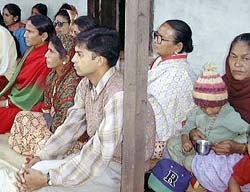| |
|
| Indian Newspaper Malayala Manorama wins IPDC-UNESCO Prize for Rural Communication The IPDC Bureau awarded the 2005 IPDC-UNESCO Prize for Rural Communication, to the Indian daily newspaper Malayala Manorama (circulation: 1.4 million copies). |
News |
The IPDC Bureau awarded the 2005 IPDC-UNESCO Prize for Rural Communication, to the Indian daily newspaper Malayala Manorama (circulation: 1.4 million copies).
The paper was awarded for its imaginative communication campaign aimed at raising awareness among the people of Kerala on the importance of water conservation as a solution to the problem of droughts in the region.
The “Pala Thulli” (Many a Drop) project was launched by the newspaper to inculcate people with a new water culture which would preserve Kerala’s plentiful rainwater and protect rivers and other water sources from drying up. Exhibitions and video shows demonstrating various methods of water conservation were organized throughout the region and attracted huge crowds. A string of creative initiatives bear testimony to the impact of this campaign: colleges, schools and even fire stations have followed Manorama and built their own rainwater harvesting systems. The Prize, consisting of a sum of $US 20 000, is awarded every two years and is intended to recognize a meritorious and innovative activity in improving communication in rural communities, chiefly in the developing countries. The two other finalists selected this year were: The Community Media Centre (CMC) of Banikoara Locally maintained and focused, with well-developed radio content and a dynamic and growing telecentre, the Banikoara CMC is a successful local enterprise. It has expanded from four donated computers to fifteen computers and offers a range of training programmes based on new information technologies and the Internet. The CMC’s combination of local radio with new ICTs has been a major factor in overcoming the Banikoara area’s isolation, which is perceived as a key obstacle to local development. Community Radio Madanpokhara Community Radio Madanpokhara (CRM) is a well-known Nepalese community radio FM station in Palpa, which has already won support from the IPDC. This station has been providing awareness programmes to the community in the field of education, health, agriculture, forestry, gender equity, ethnic groups and minorities. It also seeks to motivate the local communities to undertake innovative programmes for their own development. One of its important activities is the implementation of distance education programmes, using this medium to compensate for the closure of schools. There are plans to include 60 schools and 15 000 students in the “Radio Classroom ” activities, which targets the rural poor and the disadvantaged students who cannot afford private tuition. 
Banikoara CMC, Benin © UNESCO 
Community people listening to programmes at Community Radio Madanporkhara, Nepal © UNESCO Related themes/countries
· Prizes · UNESCO-IPDC Prize for Rural Communication · Benin: News Archive · India: News Archive 2006 · Nepal: News Archive 2006 · 2006 · News Archives: 2006 |
Contact information
Related Links
More resources
|
|
portal1.org we are portal 1 Community of Practice Software Solutions - Powered by Tomoye Simplify Version 3:01b |
UNESCO-CI
Have feedback? Email the Chief Editor Portal Statistics: 23293 knowledge objects - 6499 topics |
||